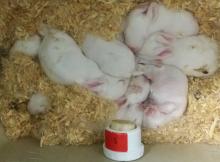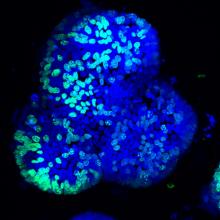Nutrition et Ecosystèmes Digestifs
The NED (Nutrition and Digestive Ecosystems) team studies the gut microbiota in farm animals in the context of the transition towards more sustainable breeding systems. Our first objective is to limit antibiotic resistance in livestock by (i) preventing the use of antimicrobials through enhancement of animal defenses against pathogens and (ii) reducing the abundance of antimicrobial resistance genes in digestive ecosystems. Our second objective is to optimize the use of feed resources by improving the action of the gut microbiota on digestion, host metabolism and on the quality of productions (e.g. milk).
Latest News
Organoids are new models that reproduce in vitro the cellular complexity, tissue architecture and certain functions of the organs they represent. Organoids are now commonly used in many fields of biology such as nutrition, host-microorganism interactions or toxicology. Organoid models have recently been adapted to farm animals but their characterization remains incomplete (1). In particular, little is known about the ability of organoids to maintain the phenotype of the animals from which they are derived.
The timing of solid food introduction and plant polysaccharides ingestion are two different tools to modulate microbiota implantation and functionality. In mammals, the introduction of solid food is pivotal for the establishment of the gut microbiota. However, the effects of the first food consumed on long-term microbiota trajectory and host response are still largely unknown.
Ruminants are able to digest the dietary fibres present in their feed thanks to the micro-organisms - particularly bacteria - present in their fore-stomach (rumen). The relationship between the composition of this ruminal microbiota and various traits of interest, such as feed efficiency, milk composition and animal health, has been established in cattle. Researchers from the GesPR and NED teams of GenPhySE laboratory have studied these relationships in dairy sheep.
The metabolites produced by the microbiota at the onset of solid food ingestion contribute to the maturation of the gut barrier at the suckling-to-weaning transition. Targeting the gut microbiota metabolic activity during this key developmental window might therefore be a promising strategy to promote intestinal homeostasis.
Microbial communities play a major role in various environmental processes, including carbon recycling and health. The engineering of these ecosystems is largely based on the control of their diversity. FROGS is a user-friendly pipeline dedicated to biologists that gives access to specific diversity of microbial communities from high-throughput sequencing of amplicons. FROGS has been developed to be very fast even on large amounts of data in using cutting-edge tools and an optimized design.
Members
Researchers
|
Corine Bayourthe |
|
|
Martin Beaumont |
|
|
Sylvie Combes |
|
|
Christelle Knudsen |
|
|
Djamila Lekhal |
|
|
Annabelle Meynadier |
Webpage |
|
Charlotte Paes |
|
|
Géraldine Pascal |
|
|
Olivier Zemb |
Webpage |
|
Asma Zened |
|
Support
|
Laurent Cauquil |
|
|
Marie-Luce Chemit |
|
|
Yves Farizon |
|
|
Corinne Lencina |
|
|
Jean-Philippe Vergnes |
|
PhD Students
|
Lisa Arnalot |
|
|
Tania Malonga |
|
|
Mathilde Rumeau |
|
|
Florian Touitou |
|
Temporary
|
Gabryelle Agoutin |
|
|
Julie Alberge |
|
|
Vincent Darbot |
|
|
Hélène Fougère |
|
|
Elisabeth Jones |
|
Former Members
|
Jennyfer Sauco |
|
|
Amira Bousleh |
|
|
Chloe Bredon |
|
|
Francis Enjalbert |
|
|
Lise Gallo |
|
|
Lauren Jouaron |
|
|
Maxime Long |
|
|
Guillermo Martinez-Boggio |
|
|
Eloïse Mussard |
|
|
Lamia Zoudji |
|






